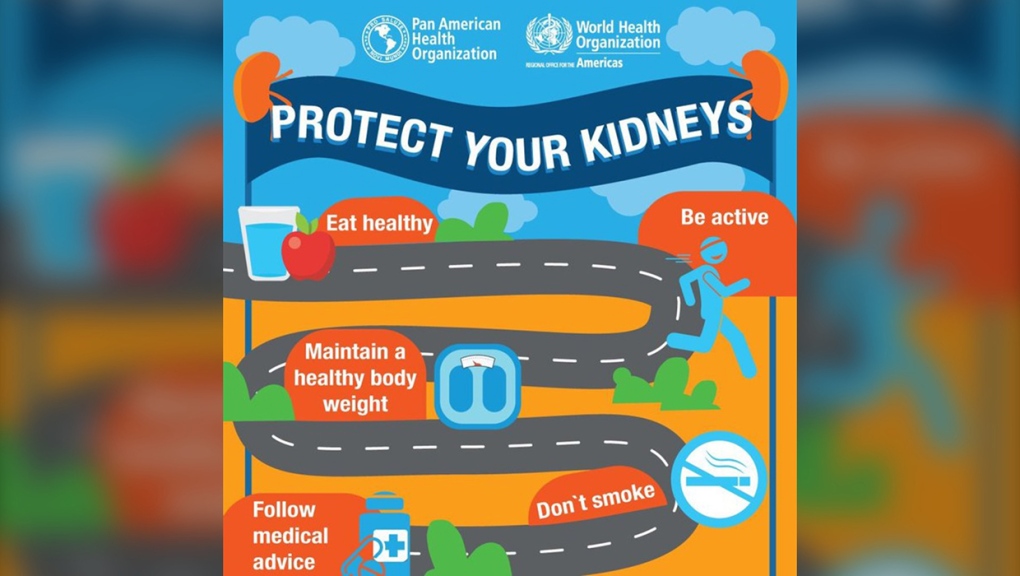World Kidney Day: Calgary teen with rare blood type looking for a kidney donor
Sana Ashoori is 19 years old and was diagnosed in 2021 with a rare disease called nephronophthisis that is decreasing her kidney’s ability to function properly.
“It’s caused by a mutated gene that’s passed down by both my parents to me,” she said. “There’s not a lot of things known about it, because it’s so rare and there aren’t really that many treatments, there’s only medication, kidney transplant or dialysis.”
Ashoori’s kidneys are operating at around 30 per cent and decreasing. She has dietary restrictions to limit her intake of salt, proteins and fatty foods. She’s also challenged with a series of symptoms including constant thirst, decreased appetite, and is constantly tired.
“Your kidneys obviously filter your blood, they provide this hormone to your blood that increases your red blood cells,” she said. “But since my kidneys aren’t functioning properly, I don’t have as much of that hormone so I have decreased red blood cells and just anemia in general and because of that, I feel a lot of fatigue.”
Shaima Rahimi is Sana’s mom and says she and her husband moved to Canada 23 years ago from Afghanistan.
“Myself and my husband, we don’t carry this disease, it was passed on maybe by our ancestors or grandparents,” she said.
RARE BLOOD TYPE
To compound matters, Ashoori also has a rare blood type called Para Bombay that is more common in people from south Asia. Now her mom is reaching out to the Afghan community in Calgary for help.
“We have advertised through our community through our mosque that we go (to),” she said. “There are some newcomers from Afghanistan that are not aware of this blood type and the disease so we are trying to educate people and asking people to come forward (because) it’s important to save my daughter’s life.”
Ashoori has shared her story on social media through Facebook to not only let her followers keep track of her journey, but also to possibly find a living kidney donor.
“I’ve talked amongst my family, I haven’t found anybody within my family with the same blood type as me so I wanted to reach out to social media,” she said. “It’s important to continue to post my updates, I think it’s a great way to connect with some of my audiences and just give people a little bit more insight about my life.”
Doctors have told Ashoori that Para Bombay blood type is characterized by the lack of the H antigen.
 Thursday is World Kidney Day, featuring the theme ‘kidney health for all.’ (Photo: X@worldkidneyday)
Thursday is World Kidney Day, featuring the theme ‘kidney health for all.’ (Photo: X@worldkidneyday)
“So when you think of blood types A has the A antigen, B has the B antigen, O has H antigen,” she said. “But my blood type doesn’t have the H antigen and it has H antibodies, which means that basically, it attacks blood types with the H antigen.”
She’s hopeful to find a living kidney donor before her kidney’s totally fail and she has to resort to dialysis.
“I hope that throughout my efforts in social media that I find a donor that has this blood type,” she said. “I can accept A or B blood types but my goal would be to find somebody with this Para Bombay blood type because it reduces the risk of rejection down the line.”
GOOD OPPORTUNITY
Joyce Van Deurzen is the executive director of the Kidney Foundation of Canada, Southern Alberta & Saskatchewan branch. She says March 14th is World Kidney Day and it’s a good opportunity for people to get their kidney function checked out because many people are living with kidney disease but don’t know it.
“So if you don’t know it, it’s silently progressing,” she said. “So the earlier people understand that they might have the risk factors for kidney disease and get themselves checked out, then they have the opportunity to slow the progression.”
Van Deurzen says if a person has healthy kidney function, they can become candidates for living donors.
“There’s so many people on the waiting list for an organ donation in Canada and three quarters of them are waiting for a kidney transplant,” she said. “If you know that you have two healthy kidneys and you’re interested in saving someone’s life, changing someone’s life for the better, then you can come forward and contact the Living Organ Donor program and get tested.”
Van Deurzen says people who donate one of their kidneys live very successfully post surgery while their second will save a life.
Learn more about kidney donation here.
WORLD KIDNEY DAY
Kidney health for all is the theme for this year’s World Kidney Day (WKD).
Every second Thursday in March, since 2006, the WKD organization has been working to raise awareness around how important kidneys are to overall health, and how to reduce the frequency and impact of kidney disease.
Estimates from the WKD organization show chronic kidney disease affects more than 850 million people worldwide, and resulted in over 3.1 million deaths in 2019.
“Presently, kidney disease ranks as the (eighth) leading cause of death, and if left unaddressed, it is projected to be the (fifth) leading cause of years of life lost by 2040,” states the WKD.
WKD says, over the last three years, chronic kidney disease treatments have focused on preparing for, and delivering kidney replacement therapies.
“However, recent therapeutic breakthroughs offer unprecedented opportunities to prevent or delay disease and mitigate complications such as cardiovascular disease and kidney failure, ultimately prolonging the quality and quantity of life for people living with (chronic kidney disease),” states the WKD, adding that in order to achieve optimal kidney care, numerous barriers need to be overcome.
“These include gaps in early diagnosis, lack of universal healthcare or insurance coverage, low awareness among healthcare workers, and challenges to medication cost and accessibility.”
with files from Kayla Pedersen
View original article here Source









